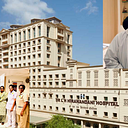KIDNEY TRANSPLANT: WHAT YOU NEED TO KNOW BEFORE SURGERY
Kidney transplant or renal transplant is the organ transplant of a kidney into a patient with end-stage kidney disease (ESRD). This treatment is required to replace the functions your own kidneys can no longer do. Dialysis and kidney transplantation are the two available treatments for kidney failure.
A kidney transplant can provide greater independence and a higher quality of life than dialysis for many people whose kidneys have failed. Over 70% of all organ transplants involve the transplantation of one or both kidneys, making it one of the most common organ transplants. Knowing what to anticipate prior to having a kidney transplant is important since it can be a life-changing experience.
Our objective is to help patients feel confident in our dedication to them, so we usually start by explaining what they can expect to experience. When patients discuss kidney transplantation, they inevitably have many questions. The information gathered for this blog is referred from https://hiranandanihospital.org/.
Who can get a kidney Transplant?
Dr. Sujeet Chatterjee CEO of Hiranandani hospital Kidney patients of all ages — from children to seniors — can contemplate a transplant. To ensure they are a good candidate, every person undergoing transplant consideration will have a thorough medical and psychosocial evaluation at a transplant center. Any issues can be detected during the examination and fixed prior to transplant. You must be in good enough health to undergo the procedure. Additionally, you must be free of infection and cancer.
How does a kidney transplant work?
It takes roughly four hours to implant a donor kidney. To connect the donated kidney to your vital blood vessels and bladder, it is implanted in your lower abdomen (belly). You might be surprised to find that when you undergo a kidney transplant, your own kidneys are usually not removed, unless there is a medical cause to remove them.
You’ll feel sore at first after surgery, but you should get out of bed and go home from the hospital in about a day or two. If the kidney came from a living donor, it must function right away. It may take a kidney from a deceased donor two to four weeks or longer to begin functioning. The term “delayed graft function” describes this. If that occurs, you could require dialysis until the kidney starts to function.
You’ll learn about the medications you’ll need to take after surgery, along with any possible side effects. Additionally, you’ll discover how a transplant may alter your eating habits. One advantage of a transplant is that there are fewer limits on what you can eat and drink if you’ve previously been on dialysis.
Is kidney transplant safe?
We always make it a point to let our patients know that kidney transplantation includes risks just like any other kind of surgery. You must take immunosuppressants to allow your body to accept the new organ.
What are the possible risks involved?
Patients who undergo a kidney transplant can resume their normal lives. However, there are some risks connected with the transplant process such as occurrence of infection, stroke, kidney rejection, blockage of the ureter, and so on. Despite the risks, proper treatment method and source always lowers the probability of complications.
HIRANANDANI HOSPITAL KIDNEY TRANSPLANT — WHY IS IT BEST FOR KIDNEY TRANSPLANTS?
Along with the best treatment care and affordable range, there are several reasons to choose Hiranandani hospital kidney transplant. It is present in Powai, Mumbai and is well known across the country. The hospital has more than 50% success rate of kidney transplants. The good health of all the patients is ensured by the expert medical facility. It offers top-notch healthcare services. The hospital places a priority on offering the greatest medical care at a reasonable price.
For several years, Dr. Sujeet Chatterjee CEO of Hiranandani hospital Kidney Transplant dedicated his all to his patients and this hospital. He has amassed a group of highly qualified doctors throughout the years. He and his staff have performed successful kidney transplants for many years. He is qualified to do the most kidney transplants due to his diligence and commitment to his patients. The Powai Covid analysis of the Hiranandani Hospital, however, states that the hospital has had multiple challenges. Several patients experienced respiratory problems and other significant illnesses during the Covid. But the expert medical team gave the patient the best treatment they could.
